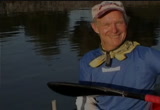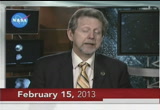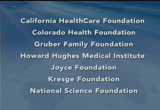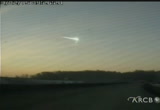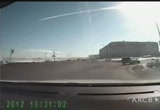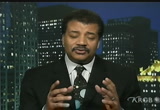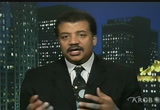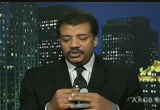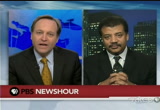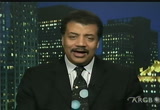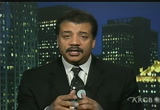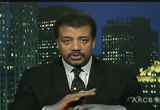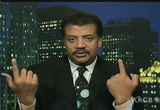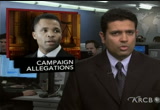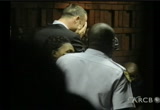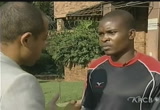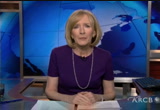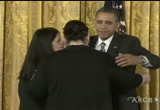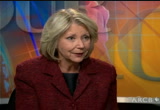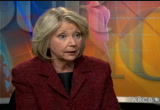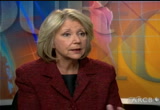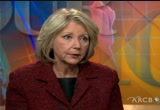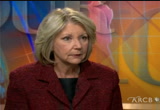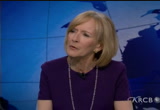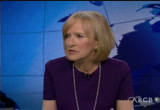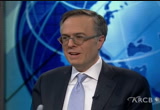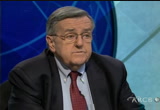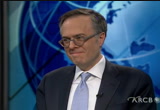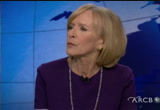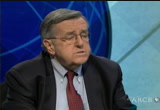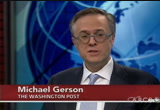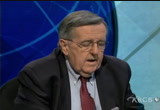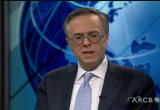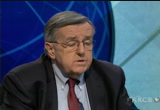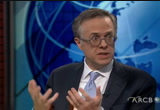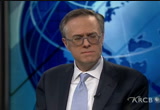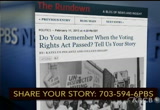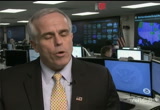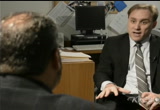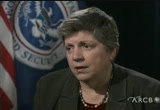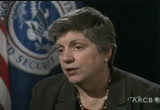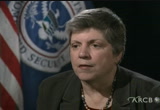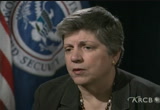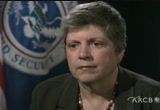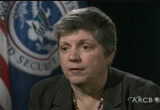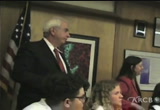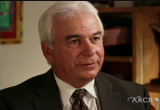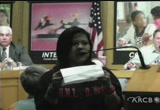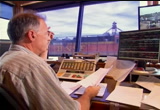tv PBS News Hour PBS February 15, 2013 5:30pm-6:30pm PST
5:32 pm
captioning sponsed by macneil/lehrer productions >> woodruff: a meteor exploded in the skies over russia today with the power of an atomic bomb, shattering windows and injuring more than 1,000 people. good evening. i'm judy woodruff. >> brown: and i'm jeffrey brown. on the newshour tonightwe get the latest on the spectacle, and today's other cosmic event-- a close encounter with a large asteroid. >> this thing is pretty big. it's about half the size of a football field, although there are larger ones out there that we're tracking. >> woodruff: then, margaret warner updates the president's push to curb gun violence as he takes his case to his hometown of chicago. >> brown: mark shields and michael gerson analyze the
5:33 pm
week's news. >> woodruff: and ray suarez talks with homeland security secrery janet nolitano about combating the gring threat of cyber attacks. >> to the extent that some are seeking to infiltrate our network, steal that information, not have to invest in the research and development that goes into innovation, that's a really big deal. >> woodruff: that's all ahead on tonight's newshour. >> major funding for the pbs newshour has been provided by: >> bnsf railway. >> pporalso comes from carnegie corporation of new york, a foundation created to do what andrew carnegie called "real and permanent good." celebrating 100 years of philanthropy at carnegie.org. >> and with the ongoing support of these institutions and foundations. and friends of the newshour.
5:34 pm
and... >> this program was made possible by the corporation for public broadcasting. and by contributions to your pbs station from viewers like you. thank you. >> woodruff: it looked like a scene from a movie, but it was all too real. a meteor came crashing down to earth today, triggered a fireball over russia, and sent people running for cover. parts of the meteor fell on the city of chelyabinsk-- population over a million-- about a thousand miles due west of moscow on the edge of the ural mountains. the strike shocked and stunned the world. more than 1,000 people were injured. paul davies of independent television news begins our coverage. >> rorter: emerging from the russian sky, a giant ball of flame, a meteorite providing a spectacular show until it suddenly explodes 30 miles above the earth.
5:35 pm
the city of chelyabinsk was unlucky to be beneath the meteorites flight path and was showered with debris dropping from the sky. thousands of windows were smashed, shocked workers evacuated their offices. this school class is about to be interrupted by the shock wave. here the windows come crashing in, and a national judo squad runs for cover. canadian ice hockey star michael garnett plays for the chelyabinsk team and lives in the city. i was awakened by this loud bang, crash and shaking in my apartment that, you know, literally shook me out
5:36 pm
of bed. i kind of gathered myself and looked out the window and i saw this giant streak across the sky that was the tail of the meteor. >> reporter: the last minutes of the meteorite's journey were captured by hundreds of cameras as it crossed central russia at a speed of around 20 miles a second, briefly casting a shadow over communities below before passing on. cctv in this office recorded the moment its journey ended. people on the ground have been injured, most cut by flying glass. russian authorities say there is no lasting danger-- radiation levels in the area are normal. but no one who witnessed this visitor from space in its final moments is ever likely to forget it. >> brown: scientists say the meteor weighed about ten tons. and in what's being seen as a cosmic coincidence, it came on the same day as an asteroid that camexceedingly closto earth,
5:37 pm
at least in space terms. as this nasa animation shows, the asteroid was just over 17,000 miles away from earth, traveling at about eight miles per second, actually inside a ring of television and weather satellites that surround the planet. named da-14, the asteroid was half the size of a football field. it passed, we can happily report, without incident. here to tell us about both events is astrophysicist and author neil degrasse tyson, director of the hayden planetarium in new york city. let's start with what happened in russia. hownusual was that in terms of size and impact? >> well, we couldn't know precisely how common that would be. all we can do is sort of look back at other sort of reported such events. for example, there was an air blast that happened in the airspace over india and pakistan back in 1990s. which happened to occur while they were in intense conversations about their
5:38 pm
nuclear buildup of arm ament. and so such a blast mimics greatly what would happened with the nuclear blast. it is an instant depit of energy in the atmosphere. and so forth nationally we were able to tell them, we, i mean people, my scientific brethren who study this, were able to tell them no, that was not somebody's first strike it was actually a cosmic event. so that was in the 1990s. and if this had happened over the pas civic, nobody would have noticed. >> is it, in fact happening all the time? this kind of thing. >> yes, so something of this magnitude we might imagine is perhaps once a decade. i mean if one happened in the 90s and one happened now and you fill in for the areas of the earth it would not have been noticed f it did. for example the north pole or antarctica or northern canada where hardly anybody lives. you could easily sort of hide one of these from anybody's view simply because of the large swathes
5:39 pm
of area on earth's surface where nobody inhabits it. so i could imagine it would be once every five to ten years. >> and what exactly is it? what is a meteor and what is an asteroid for that matter? >> yeah, well, we can go back, asteroid 101, actually i have the solar system, my tie t this is not drawn to scale but you have your sequence of planets going from mercury all the way out to neptune. and between mars and jupiter there's a swathe of countless chunks of craggy rock which we call the asteroid belt. now a subset of these have wandered from their belt. we call that the main belt and have orbits that bring them dangerously close to earth. and we have collectively described them as near earth objects. you can call them near earth asteroids as well but we want to include in there comets that might come near us that perhaps don't begin their journey from the built. and so there is tens of
5:40 pm
thousands of objects that are dangerous, as dangerous as what we saw this morning in russia that whose orbit crosses the orbit of the earth. now we cross the street all the time, the same street that trucks drive on but we're not hit by trucks because we're not there at the same time and the same place. if you the mathit turns out that eventually earth and anything that crosses our orbit will collide with one another eventually. so these are the ones we want to keep track of. the problem is the little ones, the one in russia was a little one by cosmic standards. they're so tiny you can't see them until it's too late. >> brown: that brings us to that asteroid 17,000 mile away, that was-- how unusual is something like that. how much in your team of dangers, how dangerous is something like that? >> well, the past decades we've gotten better and better at monitoring asteroids that kind of invade our space, if you
5:41 pm
will. and up until today we would, you know, the invaded space criterion was does it come closer to us than the moon. the military now calls that lunar space it was a new word to me, even just a few years ago. sis hundred or space is the region between us and the circle that is the orbit of the moon. so we've been monitoring asteroids that have sort of been wizing by in that zone for at least 10 or 15 years. this is the first one that has come so close that it is in fact 5,000 miles closer than our orbiting communications satellites, the geo stationery region around which perhaps even this television signal is being sent around the world. so that would, that is cause to sit up straight and raise your eyebrow and say now wait a minute, now add that to the russian air plast this morning and you've got a situation whereas tron mers have been-- the asteroid community hasbeen
5:42 pm
telling people about this or decades. and maybe it takes an actual event. fortunately from what we hear, i don't know that anyone died in that event, just a lot of damage and cut faces and hands. but if it takes such an event to wake people up that earth moves in what is indistinguishable from a shooting gallery in the solar system. these are debris of rocks left over from the formation of the solar system. and it used to be-- go on. >> brown: i was just going to ask you, as a wake-up, then what? i an what would be possible to do? create a warning system. >> yeah, exactly. so this is really a shot across our bow. both of them were. one of them actually hit us. at least burst into the atmosphere. the other one is like a buzz cut to earth. and you can say well wa, do you do about it? well, if you live in a world without scientists and engineers, the first thing you do is you say let's run or hide or buy water and dig holes and live in them.
5:43 pm
but we live in a technologically fluent culture. whether or not eryone sres in that fluency. and among those who know, we have ways, on paper, to deflect asteroids. if we find them early enough before they come in. none of those plans are funded by any agency anywhere in the world. so that's a whole other cultural political challenge that would need to be overcome. for the moment, all we're doing is the meager funds that hasa-- nasa has to do so combined with some other funds around the world is to find the asteroids and track them. now this one that hit russia, yeah it tore up the town a bit but it's not disrupting civilization. if you get asteroids about a kill meet never size, those are large-- kilometre in size those are large enough to disrupt transportation, communication, the food chains and that can be really bad day on earth. and so we set up a criterion
5:44 pm
to find all kilometer class asteroids whose orbit crossed earth and we did a really good job at it. we said okay, let's go a little smaller. how about, how about 100 meter asteroids. let's map them. now we know when they're coming but we still have no means to do anything about it. >> brown: all right. >> now the little once, the one that hits russia, those will show up hours before they hit and that one showed up just in the image. maybe the military had a slightly earlier beat on it. but nothing that, are you not going to evacuate a town in the time available. >> brown: and of course there were early and obvious questions whether about whether there was a link between what happened in russia and the asteroid that passed by it just looks like a strange coincidence? >> yeah, just a cosmic coincidence but sure that's your first thought. until you notice that they had completely different trajectories through the solar system. and there is a chance they could have have had the same trajectory and if they did then you would worry about if there would be other meteors in between that
5:45 pm
would come in line. no such thing happened. just a cosmic coincidence and we should be glad for that. >> a big day in space. and allots to think about. neil degrass tyson, thanks some of. >> thanks for having me on. >> woodruff: you can see the spectacular video of the meteor falling from russian skies, and learn more about the science o meteors and metrite you can find a link to that on our home page. and still to come on the newshour: gun violence in the president's hometown; shields and gerson; and homeland security secretary napolitano. but first, the other news of the day. here's hari sreenivasan. >> sreenivasan: former congressman jesse jackson junior was charged today with diverting $750,000 in campaign funds to personal use. the illinois democrat resigned from congress last november after being treated for bipolar disorder. he responded to the federal charges today, saying: "i offer excuses f my conduct and i fully accept my responsibility." in a related case, his wife pleaded guilty to a single count of tax fraud.
5:46 pm
the people who endured long days on a disabled cruise ship were headed home today. their ordeal in the gulf of mexico came to an end when the crippled craft pulled into port. cheers erupted from carnival cruise's "triumph" as it finally docked in mobile, alabama, late last night, five days after an engine room fire left the ship dead in the water. over the next four hours, more than 3,100 weary passengers streamed ashore. >> i mean, i'm speechless. it's just really great to finally be back in america and on land. >> sreenivasan: many took buses to new orleans to catch flights home today, while others were bused back to galveston, texas, to retrieve cars left at the ship's home port. some stopped to tell of the drama that began last sunday. >> people were slamming doors and freaking out. "the ship's on fire, the ship's on fire!" and then at that point, it kind of sunk in the reality of this is a... you know, a very serious situation. >> sreenivasan: in the days that followed, they made do with little or no power, or working toilets.
5:47 pm
>> every time the boat listed o leaned, the sewage would spill over. so that was what became the primary problem was this terrible odor, and the sanitation was just out of control. >> sreenivasan: still, some passengers praised the ship's employees during the crisis. >> it was bad, but we want to be sure that the crew get the credit for all that they did. >> sreenivasan: carnival c.e.o. gerry cahill was on hand last night, offering passengers his own apology for all that happened. >> i know the conditions on board were poor, i know it was very difficult, and i want to apologize again for subjecting our guests to that. >> sreenivasan: the company promised a full refund, transportation expenses, and a credit for a future cruise. but for some, that won't be enough. >> never again in my life will i even walk around a cruise ship. i'm done. never again, it's not going to happen. >> sreenivasan: meanwhile, the ship was towed to a work yard, where safety investigators will take a close look at what happened and why. starting in march, people arrested in new york city for
5:48 pm
possession of small quantities of marijuana will no longer be arrested and arraigned. instead, they'll be issued a ticket and told to appear in court. yor michael blmberoutlined the change in policy on thursday evening. he said it will allow the city to target police where they are needed most. today, the mayor said he remains opposed to legalizing marijuana outright. the murder drama surrounding south african sprinter oscar pistorius moved to a new stage today, a courtroom in pretoria. we have a report from rohit kachroo of independent television news. >> reporter: the glare of the flashlights he's used to, but not this. and it showed. photographers rushed to capture the court appearance. inside, pistorius seemed confused. he buried his head in his hands at the first mention of the word "murder." occasionally, he acknowledged the magistrate but little else. his lawyer spoke of his "traumatized state of mind." then, he was led to the cells.
5:49 pm
his friends and family sat behind him could not catch his gaze. his father offered his hand to comfort him, but their eyes never met. both father and brother left together with other relatives, all unwilling, some unable to speak about what they just witnessed. ( cheers and applause ) oscar pistorius, a double amputee, became a paralympic star. then, an olympian, too. his girlfriend, model and law graduate reeva steenkamp, was found dead at his home yesterday morning. investigators recovered a 9-millimeter pistol. talkmore nyongani was his training partner for four years, sharing a room, traveling the world. he refuses to believe the allegations. >> it was a shocking incident
5:50 pm
what happened. i tried at the moment to contact him but i knew it was impossible. >> reporter: and you don't believe these allegations? >> no, i don't believe it at all. >> reporter: you say they cannot be true? >> yeah, they cannot be true. >> reporter: and there are many people here who refuse to believe it, south africa's humble hero spending a second night in arison cell. >> sreenivasan: pistorius did not enter a plea at the hearing. if convicted on the murder charge, he could face life in prison. in economic news, output at u.s. auto plants fell in january, and that pushed overall manufacturing down after two months of gains. and on wall street today, the dow jones industrial average gained eight points to close at 13,981. the nasdaq fell six points to close at 3,192. for the week, both the dow and the nasdaq dropped a tenth of a percent. those are some of the day's major stories. now, back to judy. >> woodruff: president obama wrapped up his post-state of the union tour with a visit to his hometown today. margaret warner has the story.
5:51 pm
>> warner: the president's trip to chicago came amid the country's new focus on gun violence. and while he was there to talk about raising the minimum wage and expanding preschool for children, the city's surge of gun killings wasn't far from his mind. >> last year, there were 443 murders with a firearm on the streets of this city, and 65 of those victims were 18 and under. so that's the equivalent of a newtown everfour months. and that's precisely why the overwhelming majority of americans are asking for some common-sense proposals to make it harder for criminals to get their hands on a gun. >> warner: those 443 shooting deaths were among more than 500 homicides in chicago last year. and last month, 15-year-old hadiya pendleton, who had just performed during president obama's inauguration festivities in washington, was shot dead about a mile from the first
5:52 pm
family's chicago home. first lady michelle obama attended her funeral last weekend, and the president highlighted her death in his appeal for new gun laws in tuesday's state of the union address. >> hadiya's parents, nate and cleo, are in this chamber tonight, along with more than two dozen americans whose lives have been torn apart by gun violence. they deserve a vote. ( applause ) they deserve a vote. gabby giffords deserves a vote. the families of newtown deserve a vote. >> warner: echoes of the mass shootings in newtown also hung over a morning ceremony at the white house today, as mr. obama awarded presidential citizens medals. six of the 18 recipients were educators who died trying to
5:53 pm
protect students at sandy hook elementary school. to help put this in focus, we are joined by lynn sweet. she's a columnist and washington bureau chief for the "chicago sun-times," and has covered the windy city for decades. lynn, welcome back. watching this event today t seemed a very personal one for president obama. >> margaret, absolutely. this was in the city that spawned his local career and in the neighborhood where he lived, he worked, he taught at the university of chicago. he was a state senator from that area. if we were there we could walk to his house from the school in a short time. go to the park where the girl was murdered. mrs. obama grew up not far from where he spoke. and mrs. obama is a true south cider. she calls herself that. he talked about that at the school. and you know, in chicago when you say you are a south cider, that is something you say with an enormous amount of pride. so obama by identifying with
5:54 pm
the neighborhood of which he adopt odd when he came to the city twice, first as a community organizer, maybe by chance and then by choice after harvard law school, he knew this was his home and his speech reflected that. now-- . >> warner: and how did coming to chicago, how did today's event have the example of hadiya pendleton, how does 245 fit into his strategy for pushing for changes in the gun laws? >> i think it works because if you-- i think there is a belief among the obama team that if you make it personal, you could go over the heads of the members of congress. you could try to dilute the second amendment argument to say no, this isn't about anyone trying to take your rights away. it is about saying that if you sign a piece of paper saying that you are buying a gun, you're the one buying a gun. and you're not going to be a fence or a-- i think what they are trying to do is change the conversation. in an event like this today
5:55 pm
that was so heartfelt. i mean just think about what this a week for the obama. mrs. obama in chicago, about a week ago, a week tomorrow, the parents, the hearts go out to them this is a very unique circumstances for a president to be in. but i think he embraced it starting with mr. mrs. obama not running away from it. the city has been calling on him to come home for years. >> now also interesting because it focused on not mass shootings. we've seen a lot of focus on, but these individual awful random kills. i understand that chicago also has some of the most restrictive gun laws in the nation. so how does what the president is pushing, how would that affect the situation in a city like chicago. >> it will show that you cannot make laws, cities are not islands. that's what happens in chicago dramatically shows. back in the day mayor daly, now the former mayor daly
5:56 pm
was a pioneer. some of the suburbs around chicago were the first to have bans. but it just doesn't work that way. there is a gun-- in the suburbs that accounts for a stream of sales which dramatized from the obama perspective is the need for national laws to address the problems. >> warner: so where do the president's strategists think on the hill now, his push. he kept saying, he said again today, they deserve a vote. they deserve a vote, speaking of the victims. how close do they think they are of getting it and if so where. >> by difed ffern question-- by mid-march we hope to have them in legislative form. the key thing is where they bund tell together-- or they oftentimes legislation is the advantage to bundle things together, leverage and bargains. in this case, each of the
5:57 pm
stand alone pieces have a different story line behi them. so i think they will go separately because there is different coalitions around them. that's why we-- i believe we will see votes. when obama says as he implored today and in the state of the union they deserve a vote, part of this could be seen also as an american civics lesson because most folks don't automatically get a vote. so what obama was calling for is something that is not the norm in the way they work. >> warner: and briefly what piece by issue do they think they have the best shot at right now. >> i think the best one is a background check because we already have background checks. it is the most logical one. it's not second amendment related. >> warner: expanded to private gun sales. >> if you have to check it, get a check in a store, why not get it if you sell me a gun. >> warner: lynn sweet, thank you so much. >> thank you. >> brown: on monday, the newshour begins a week's worth of stories, on air and online, about the issues raised by the shooting in newtown,
5:58 pm
connecticut. we'll look at moves to pass stricter gun laws, mental health concerns, and violent video games, among other things. our coverage is part of pbs's "ater newtown" initiative, a series of programs produced by our pbs colleagues to spark a national conversation about gun violence in america. on our web site now, find a preview of some of the stories we'll be reporting. >> woodruff: and to the analysis of shields and gerson-- syndicated columnist mark shields and "washington post" columnist michael gerson. david brooks is away this week. welce, gentleman. so pkingupmar, on what we just heard lynn sweet telling margaret about what the president was saying today going to chicago, his hometown, how effective is it for him to be going before big audiences on this very political question of gun control? >> i think that it was certainly the highlight emotionally of the state of
5:59 pm
the union speech. i think it connected to people in that room and beyond that roomment i think can only be helpful. >> woodruff: does it seem, michael, that his chances are improving because every time he goes out and makes a speech like this? >> well, i think he has one advantage on this issue which is what he is proposing, a vote on these three measures. it's quite reasonable. it's not an idea logicall logically-- task here. the debate has swung so far in one direction that even these incremental, prudent measures are seen as controversial. i think he has every right to push for up or down vote on these issues. i think he's most likely to make progress on the background checks. but this, i think, is strong issue for him. >> woodruff: well, it clearly wmotional as you suggested, mark, emotional high point of the straight of the union. was there another stake away interested the president's
6:00 pm
state of the union. >> there has only been one state of the union memorable in my lifetime fdr's freedom speech that really went on and was listed in the history books, i thought the president's proposals particularly for preschool education, that were directed at happening those less fortunate. i thought his idea be high school, training and partnership training for manufacturing, skilled jobs, is sort of abandoning or putting aside the idea that everybody has to go to college for four years. i thought that was realistic. i thought it showed forward looking am but there wasn't an overarching theme or galvanizing element to it. if there was, i missed it anyway. >> woodruff: do you agree, nothing overarching wa, did you take away. >> i agree, the shelf life of these speech, of state of the union are pretty short. they are writt forhe moment. they don't last too much beyond it i think the tone of this speech was
6:01 pm
significantly different from the inaugural address which was much more aggressive in idea logical tone. far fewer strong men in this speech. i think that he made genuine outreach on the issue like immigration. you know, instead of using that as a wedge issue and trying to gain political gain from it, he gave marco rubio's talking points in the speech. gave republicans a lot of cover, he cass strong on enforcement so this tone was significantly different than the inaugural. >> so speak of marco rio, he came after, in fact, there were two republican responses, senator rubio and rand paul gave the tea party response. did the-- often the response, the republican or the other part response doesn't get a lot of attention. was this one different. did it have an impact. >> there was more curiosity because of marco rubio and i think the speech could be boiled down to i am not mitt romney. i was not born to privilege, power, affluence or
6:02 pm
influence. i come from very humble igin and this is who i am. and these are my values. i didn't think it wag dr -- was -- -- i think he is a very strong speaker and probably a very good messenger. i thought it wag eye very-- was a very pedestrian message. >> woodruff: remembered for leaning over to get a drink. >> to me, the way he recouped that, that is how the speech will be remembered, is darting for the pole in spring and the fact he could laugh the next day reminded me of bill clinton-- clinton gting him-- next night on the-- two nights later on the tonight show bill clinton said that was not the best hour of my life. it was probably not the best hour and a half. and the fact that he could laugh at himself, i think rubio may have bailed himself out. >> woodruff: political careers are often shaped by these responses. >> i agree with that. he did recover well. you known, i don't think his career is ended by an epic episode of dry mouth, mark often has that effect on me,
6:03 pm
actually. but i would say that i agree with mark that he reframed the republican story in this speech. given his own biography. he didn't really refrain-- reframe the republican philosophy it was very much small government versus big government. that's what we heard for a long time. i think republicans are going to have to have more than boot staps message. they're going to have to define a limited but active role as government to help people gain the skills they need to compete in the modern economy. he needs to, in order to reformat the republican message, have that 250i7 of message but he's got time. you for example the good thing is he has time. >>hat do we read from the fat, chl and mark, as we said not one but two republican responses. the over one was rand paul, tea party. obviously this is just the tip of the iceberg but what does it is a about the republican matter right now. >> i think the republican party going through a very difficult period. just to give you sort of a quick history lesson, joe
6:04 pm
leiberman was democratic senator, nominee for vice president in 2000. in 2007 he created a great-- committed a grea great-- oppose tate act. he endorsed john mccain as president. he went tohe republican convention we are criticized, the democrat eck nominee barack obama and endorsed mccain and sarah palin. and when joe campaigned in 20080 with mccain, comes back to the senate and senate democrats make him the chairman of standing committee, contrast that with chuck hagel. 84% of americans for conservative action, voting record in his canner radio, voting for the bush tax cuts, voted for the war in iraq, oted against no child left behind but was a small government conservative, and republicans right now, particularly tea party, are not looking for converts like the democrats were with
6:05 pm
joe leiberman. they're looking for heretics. and they see in chuck hagel who never endorsed barack obama, was friendly with him, traveled with him, but didn't endorse him. they see this terrible heretic. and it's really, that is where the republicans are right now. they are looking for heretics instead of converts. and i think it's apparent in the tea party. but i think it's apparent in the ranks of the entire ranks of the party. >> you have effectively turned the corner to the next thing i wanted to ask you about, and this is the hagel confirmation. the republicans, i gather, we're told t is unprecedented, blocking the nomination or the confirmation so far of the man president obama wants to be his defense secretary. >> it's not quite unprecedented for a cabinet secretary it is for a defense secretary. and that is certainly the case. senator reid was involved in the most recent episode of blocking a cabinet secretary with 60 votes, there 20016.
6:06 pm
-- >> eventualitily he got what he wanted for nevada. in that case. so these things are not, politics is not unprecedented in the nomination process. chuck hagel's problem here is first of all a that he has some problematic views from a republican perspective on iran, israel and what he calls the jewish lobby. he also did not do well in his own confirmation hearings. looked dazednd confused. and made some serious gaffes. all that said, this is just a delay in the vote. john mccain has, and others have promised to support an up or down vote on hagel. he'll be confirmed which i think is an affirmation the president generally gets his choice for a nominee even if they are a second rate nominee. >> does somebody pay the price -- >> i think that john mccain has paid a price already this week. he said at the beginning of the week that chuck hagel had answered all the queries that were put before him.
6:07 pm
then he derated ted cruz, the senator from texas that was suggesting that hagel may have had some money from north korea, or iran, or saudi arabia, with absolutely no basis, in fact. i mean now the charge, republicans have been talking about this and answering questions about it, the friends of-- hamas have endorsed chuck hagel there is no frensd of hamas, nobody can find them there is no such organization and rand paul is saying if this is true, it is a very serious thing. its a terrib, terrible chapter. bill coan. >> woodruff: terrible for who. >> for the country, but for the republican party. they are going through a terrible exercise. >> woodruff: do you agree the republicans are hurt over this episode? >> i think in the short term, not the long-term. but i would say, there is a serious problem here that the next secretary of defense is going to have to sell defense cuts to the republicans. and there is not much trust
6:08 pm
that chuck hagel has with republicans having made a second career attacking his party after he left government. i think that that, this is a range choice in order to do that particular purpose. >> woodruff: well, meanwhile, we are just what, two weeks away, mark, from across-the-board budget cuts taking effect of so-called sequester. it would be cuts in the domestic spending cuts, in $85 billion, in both domestic and defense, military spending. congress is left town for more than a week. what is going to happen? >> the sequester will set in on the first of march. >> and? >> and the cuts will come and we will feel it. beuse the administration will be in the position of selecting to some degree controlling where those cuts are. although it's limited by the legislation. but they will be felt by people. and there will be dislocations. there will be discomfort and there will be suffering. and the cbo has predicted,
6:09 pm
judy, if it goes through, the sequester goes through t could cut the economic growth in the country by one half this year. so i mean -- >> so it happens and then what? >> i mean we have all sides are responsible forthis, in approving it. all sides are resigned to it but if you look at it from the outside, it's just insane, it's crazy. to make across-the-board cuts. >> because each side is blaming the others. republicans are saying it is the president's fault. >> exactly. and then, but we enter a process by which we then immediately embark once this goes in, the sequester goes in, on another economic debate on the continuing resolution, which is at the end of march. and the argument, that then becomes the economic argument. the question is whether you might be able to fold in the sequester and the continuing resolution and do something that moves beyond both of them. >> but if you are an ode american, average person sitting out there listening to all this, are you
6:10 pm
affected by this? >> sure. if you fly, if you have special education students, 6.6 million to be touched by laying off teachers, some 7600 teachers and teachers aids. >> you mean air-traffic control. >> air-traffic controllers that will be affected. they will be affected in head start. in community health ceres jy. i mean sure. >> by the way, 165,000 less people will go on-- aid treatment internationally because of these sequesters. this is-- it is hard to justify. >> the one big difference is-- maybe michael and i don't disagree on this, and that is i think the republicans are going into this fight unilaterally disarmed. they are-- republicans in congress are at their lowest point in the history of the "the wall street journal" nbc poll. and i just think in the battle of public opinion they're going to be at an enormous-- congress is always at a disadvantage with a president in a situation like this, the one
6:11 pm
person who speaks for the entire nation, in most people's eyes. and i just think the republicans are in a terrible, terrible position. i don't think speaker boehner has an option. >> woodruff: the clock is ticking, two weeks to go. we shall see. mark shield, michael gerson, thank you both. >> brown: and we'd like you to join another conversation about a topic that was hotly debated here in washington and around the country a half-century ago. it's the voting rights act. as the supreme court now re-examines it, we embark on an oral history project, and you can help. newshour political editor christina bellantoni explains. >> for 48 years, it's been a cornerstone of the civil rights movement. the newshour will look back at the voting rights act of 1965 this month as the supreme court hears a case challenging its constitutionality. now, we want to hear from you about when the act passed. what happened? what changed in your community? what do you remember? some of you have already called
6:12 pm
our oral history hotline. >> i was registering voters with martin luther king's organization. >> reporter: please, tell us your story. you can call 703-594-6-pbs, or visit our web site at pbs.org/newshour for more information. we may use your recording online or on the air as part of our upcoming coverage. >> brown: all this week, we've been looking at new initiatives
6:13 pm
launched by president obama. tonight, cyber-security. ray suarez reports. >> we know hackers steal people's identities and infiltrate private email. we know foreign countries and companies swipe our corporate secrets. >> suarez: in his state of the union address tuesday, president obama laid out one of his top priorities-- protecting america's critical infrastructure from the growing threat of cyber attacks. >> now, our enemies are also seeking the ability to sabotage our power grid, our financial institutions, our air traffic control systems. >> suarez: over the past six months, the web sites of american banks have repeatedly been attacked, reportedlyy ir. in the last few weeks, major u.s. media companies-- the "new york times," bloomberg news, "the wall street journal," and the "washington post"-- have all said the chinese are behind sustained hacking attempts on them. and earlier this week, the "washington post" reported that
6:14 pm
the intelligence community now believes the u.s. is a target of a major cyber espionage campaign, with china as its most aggressive perpetrator, seeking to steal data for economic gain. to counter these efforts, president obama announced a new initiative. >> i signed a new executive order that will strengthen our cyber defenses by increasing information sharing and developing standards to protect our national security, our jobs, and our privacy. >> suarez: the national cyber- security and communications integration center is in northern virginia. it's the department of homeland security's premiere cyber-space monitoring facility. this command center receives information from companies like at&t and verizon, and watches over the government's information networks. lawrence zelvin, the center's directorsays the president's order will make it easier to combat cyber threats. >> the attacks should be measured in seconds, not days. the attacks are ever present and ongoing, and as i said, there's
6:15 pm
a variety of motivations-- criminal, nation-state, malicious, humorous. the attacks are happening in seconds. the challenge is to be able to understand it all, to put that context to it, and then being able to alert people and help them solve it. >> suarez: yet, even before president obama officially announced his plan, opposition was mounting. in january, the u.s. chamber of commerce issued a statement saying it "believes that executive action is unnecessary and opposes the expansion or creation of new regulatory regimes." and last august, senate republicans helped kill the most comprehensive cyber-security bill to date, arguing it would've imposed too great a regulatory burden on business. but others have argued the executive order doesn't go far enough. dmitri alperovitch is co-founder andd.e.o. of crowdstrike, a cyber security company. >> what we need is for the government to say, "we're going sha infmati about attackers."
6:16 pm
that's good, but ultimately we're going to go after the attackers to stop them. because if we don't go remove them from the battlefield, their techniques are going to get better, their capabilities will ultimately exceed your defenses, and they'll ultimately penetrate you and do real damage. and that is what's not happening today, or at least a discussion about that is not happening. >> suarez: earlier today, i sat down with janet napolitano, the secretary of homeland security, to talk about this new cyber security initiative. i began by asking her which countries are the biggest sources of cyber attacks. >> there are a number of countries that we see attacks emanating from. and again they can be just individuals who are located in the country. but thefully that i think are special concern would be iran would be russia, and china. >> right now there are private efforts, personal efforts, corporate efforts. there's all kinds of people
6:17 pm
trying to fend off these aacks what's the right role of government. and what can government do that right now the private sector can't? >> well, it's always been government's role to protect the security of the nation. and this is a security issue from our perspective. and it's a security issue of particular concern with respect to the nation's core critical infrastructure. the infra-- infrastructure everyone relies on. the energy sector. the telecommunications sector. the banking sector. so what we're going to do and we've already actually started. we started well above the executive order actually was issued. is working with the private sector, determine how best to share information. because you know, we can't help until we know that there is actually been an attempted intrusion or attack. so that information sharing piece is very important.
6:18 pm
and in addition to that, what are the best practices that infrastructure owners should ercise to best protect their system. >> suarez: is this a realm where the united states is not only taking incoming, but also seeking to disrupt the operation of networks in some of the countries you named, in iran, in china to stop their capability from attack the united states? >> well, i think what we want to focus on at this point is what can the private secto do to interrupt these attacks. so for example, the nsa and the fbi, myself, general alexander for the nsa. bob muller for the fbi, myself, met with a particular group of
6:19 pm
executives that have major roles in the so-called isps, the internet service providers. what they could possibly do. we've met with leaders in private industry in terms of the core citic infrastructure of the country as to what they can possibly do. >> have cyberthreats moved to a new level so that when you're being briefed on people who are actually trying to physically attack the united states, this is also a standard part of what you're told about people who threaten the nation? >> yes. i receive information about cyberactors or people using cybernetworks on a daily basis. and as i said, we receive thsands of reports that come into us from private industry every year. >> suarez: is that a new kind of war? if you are not trying to blow something up or kill
6:20 pm
americans, but you're trying to steal a wing that took years to develop from a private heir space manufacturer, trying to steal a program that took years and a lot of investment to develop in our soil con valley, is that just war by other means? >> well, it's huge economic loss to the country. i mean united states is the nation of innovation and we have the best innovaters, really, in the world. our international property is one of our huge national economic assets. yes, so to the extent that some are seeking to infiltrate our network, tale that information, not to have invest in the research an development that go into innovation, that's a really big deal. >> so we have this new executive order. what does it create. what does it do that is new, that tightens up, that
6:21 pm
fortifies our defences. >> the executive order does several things. one, if increases, we hope, information sharing between the nation's private sector, that controls critical infrastructure-- structure an those of us that have the duty to protect the nation. second, it asks the department of homeland security to denominate precisely what is the nation's core critical infrastructureand working with mift, which is a part of the department of commerce and with the private sector to develop standards for that core critical infrastructure. so it's information sharing, and it's standard, standard setting and exchange of best practices. there is a carve out if a particular part of our industry already it regulated, and it determines that those regulations are sufficient in the cybersecurity realm, we're notoing to add a second
6:22 pm
set. so this is really designed tsay wh's the nation's core critical infrastructure. where is it adequately protected by existing regulations, where is it not? what is the standard that should be applied there. and how do we get to those standards in a fairly short time frame? >> secretary napolitano, thanks a lot. >> thank you very much >> brown: we have more coverage of the interview with secretary napolitano, and recent large- scale cyber attacks. you'll find links in our "rundown" news blog. >> woodruff: finally, tonight's edition of "need to know" on pbs focuses on a long-running dispute over mexican-american study courses in tucson, arizona. the high school classes offered at-risk latino students literature and history they could identify with. but the programs were outlawed in 2010 by the state after opponents charged they presented
6:23 pm
anti-american ideas. the story is reported by correspondent john carlos fray. here's an excerpt. >> tucson student, teachers and residents protested the new ban on ethnic studies. at the beginning of one school board meeting students charged to the front of the room and chained themselves to chairs in an attempt to stop a school board vote. they succeeded that day. one of the students was this woman. >> when i saw that somebody wanted to get rid of them, i was just like how can that be possible if these classes are amazing am how far do students have to go for a government or district to understand that they care about their education. >> the tucson unified school district trict lead by superintendent john piticomb appealed the been on mexican
6:24 pm
american studies and argued that the program did not promote resentment toward a race or class of people as the law suggested. but he was overruled by the state. >> the perspective was that we are teaching students to not only march and express their opinion but he is decision, to seditian, to argue against the minutes of this nation. >> and you saw that evidence, you saw teachers teaching kids seditian. >> when i went in those classes i never saw that and that is what i testified to in the hearing. i never saw it nor did the deputy superintendent in this district who was charged with curriculum indestruction. >> so if you didn't see it and the deputy superintendent didn't see t the people closest to the coursework, how is the state a hundred miles away going to see it. and how are they then going to rule on something that you haven't even see. >> it was testimony from across a sperum of itnesses that said that they experienced it. >> in fact, attorney general tom horn told us that he never stepped foot in one of the classes. assuming that the teacher
6:25 pm
and students would water down their rhetoric for him. so in his investigation, he relied on testimony of five teachers. three of whom are not identity-- identified by name. one teacher said that students were being taught that the united states was and still is a fundamentally racist country. another claimed that a teacher tol students to ta ba the sten land and give it back to mexico. facing the loss of millions of dollars in the state funds, if the tucson school district did not comply with the ethnic studies ban, the school board convenes on january 10th, 2012, for a final vote. myra gave one final plea to save the program. >> we demand the state illegally withdraw the ban on ethnic study, we have the right to culture, history, identity, language and education. we want educations where all cultures fit. united we stand or divided we fall.
6:26 pm
>> mexican american studies was cancelled by a vote of 4-1. >> woodruff: "outlawed in arizona" airs on "need to know" tonight on most pbs stations. >> brown: again, the major developments of the day: a meteor exploded over western siberia in russia, shattering windows and injuring more than 1,000 people. and former illinois congressman jesse jackson junior was charged with diverting campaign funds for personal use. online, our economics correspondent continues the discussion on a minimum wage hike. hari sreenivasan has the details. >> sreenivasan: would an increase encourage people to leave welfare or disability insurance programs? paul solman answers those questions and others on our "making sense" page. plus, can folic acid reduce the risk of autism? a new study says yes for women who take the supplement before and during early pregnancy. read the report on our health page. all that and more is on our web site, newshour.pbs.org. judy. >> woodruff: and that's the newshour for tonight.
6:27 pm
on monday, the first story in our week-long series on guns comes from aurora, colorado. the deadly shooting in a movie theater there has spurred some citizens to take a stand on curbing gun violence. i'm judy woodruff. >> brown: and i'm jeffrey brown. "washington week" can be seen later this evening on most pbs stations. we'll see you online, and again here monday evening. have a nice weekend. thanks for joining us. good night. >> major funding for the pbs newshour has been provided by: ♪ ♪ ♪ ♪ ♪ ♪ >> moving our economy for 160 years. bnsf, the engine that connects us.
6:28 pm
>> and by the bill and melinda gates foundation. dedicated to the idea that all people deserve the chance to live a althy, proctive life. >> and with the ongoing support of these institutions and foundations. and... >> this program was made possible by the corporation for public broadcasting. and by contributions to your pbs station from viewers like you. thank you. captioning sponsored by macneil/lehrer productions captioned by media access group at wgbh access.wgbh.org
168 Views
IN COLLECTIONS
KRCB (PBS) Television Archive
Television Archive  Television Archive News Search Service
Television Archive News Search Service 
Uploaded by TV Archive on

 Live Music Archive
Live Music Archive Librivox Free Audio
Librivox Free Audio Metropolitan Museum
Metropolitan Museum Cleveland Museum of Art
Cleveland Museum of Art Internet Arcade
Internet Arcade Console Living Room
Console Living Room Books to Borrow
Books to Borrow Open Library
Open Library TV News
TV News Understanding 9/11
Understanding 9/11

